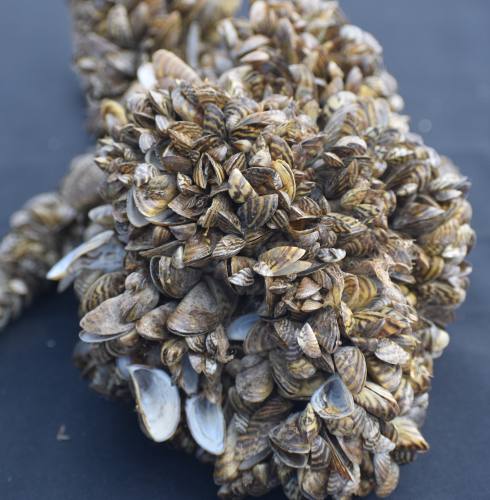Local entities are encouraging boaters to take steps to ensure that an expected infestation of zebra mussels at Grapevine Lake does not interfere with water intake or cause environmental damage.
The Texas Parks and Wildlife Department in June announced a juvenile zebra mussel and microscopic larvae were found at the U.S. Army Corps of Engineers-operated lake. Zebra mussels are an invasive species that pose an ecological and economic threat, damage boats and threaten a city’s water supply by clogging pipes.
Grapevine Lake is soon expected to be classified as infested—or having an established, reproducing zebra mussel population—according to TPWD District Fisheries Biologist Raphael Brock.
Neighboring Lake Lewisville is classified as an infested lake. Both Grapevine Lake and Lake Lewisville are used for water supply for different municipalities, and Lake Lewisville is the main water source for Lewisville, according to Lewisville Director of Public Services Keith Marvin.
Army Corps of Engineers Manager for Grapevine Lake Kenneth Myers said the zebra mussels could cause an increase in maintenance funding for the lake in order to help prevent the spread of the species.
An invasive species
Zebra mussels were first discovered in Texas at Lake Texoma in 2009 and since then have spread to several surrounding lakes.
“[Lake Texoma is] where the whole infestation came from,” Brock said. “More than likely it was spread from boaters who did not clean their boats. However, we do have a lot of lakes that are connected via pipes and a lot of lakes that have downstream flows into another lake, which are all ways that zebra mussels can spread as well.”
The rapidly reproducing zebra mussels can have serious economic, recreational and environmental impacts on Texas reservoirs and rivers, a Texas Parks and Wildlife news release said. It went on to say zebra mussels can harm native freshwater mussels and other aquatic species, affect water clarity and cause harmful algal blooms, cover shoreline rocks and litter beaches with sharp shells, clog water intakes, damage or increase maintenance on hydroelectric and other facilities using raw surface water, and damage boats and motors left in infested waters.
Texas state law requires owners to drain water out of a boat before leaving the water, Brock said. He said TPWD has been working to educate the public to also clean a boat with high-pressure water and soap and let it dry for at least a week before moving to another lake that is not infested by the mussels.






